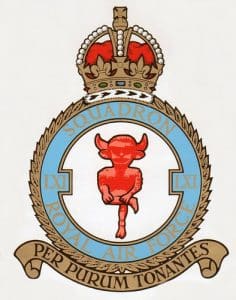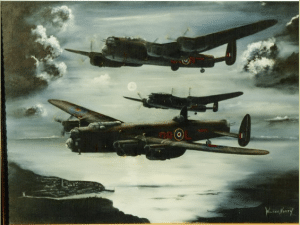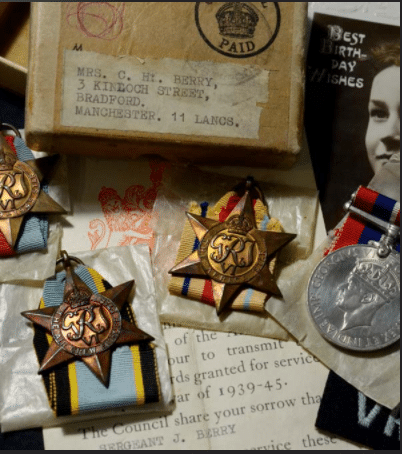

The Lancaster bombers of 61 Squadron thundered down the runway into the gathering gloom on yet another one of their relentless crusades and the early Autumn air was alive with the mix of mown fields and aviation exhaust fumes.
That year had been quite a warm one in England and drier than average conditions in the midlands meant many onlookers were shirt-sleeved, the groundcrews doing what they always did, and waving them all off with forced smiles, whilst saying a silent prayer for their safe return.
It was 16th September 1942, just after 8.00 pm and the Squadron was on its way from RAF Syerston near Newark in England, to attack the Krupps armaments installations at Essen in Germany’s Ruhr valley.
There was as always, a tense anticipation for the crew of Lancaster W4173 QR-L as the huge fully-laden monster lifted itself from the runway and then once the Skipper and Pilot, Warrant Officer Aubrey Osman, a straight-talking New Zealander, did his usual round-robin check-in with everyone, things settled down.
This would prove to be a fateful night for all onboard but for one crew member in particular, Air Gunner Sergeant Harry Broadhead, he must have been feeling quietly thankful and somewhat optimistic. This was his 29th “Sortie” of a planned Tour which consisted of 30 Operational flights over enemy territory and once this and one more were under his belt, “that was it!” Completing his first Tour would lead to a well-earned break from “Ops” for perhaps 6 maybe even 9 months as an instructor in a training unit and surely by then, things would be much easier.
Aside from himself, the average age of the other 6 members of his crew that night was 22 but Harry at 29 was considered to be quite old, although this did have its benefits he often thought.
Namesake to his father, Harry was born on 20th October 1912 in Batley, West Yorkshire, into what was considered a middle-class family and was the youngest of 6 children. At the start of WW2 he was working as a postman but was also a talented musician who played the piano accompanying silent films in local cinemas.
Always a happy and gregarious man, he had married Agnes on Christmas Eve almost 10 years prior in 1932 and they now had 3 children, Roy aged 9, Gary aged 3 and Mollie aged just one.
He had volunteered to join the RAF on 29th May 1940 and during his training, attended No: 8 Air Gunnery School, moving on to No: 25 Operational Training Unit (OTU) before joining 61 Squadron in November 1941 when his full time operations over enemy territory began.
The other members of the crew that night was a mix of men from across the British Commonwealth; Warrant Officer Aubrey Osman aged 23 was from Canterbury, New Zealand. Sergeant William MacPhee, the Navigator was 24 and from Coogee, New South Wales, Australia. The Mid-Upper Gunner, Sergeant Charles Maxwell Thorn, 24 was also an Australian from Mosman, New South Wales. Sergeants Thomas Woodhouse the Bomb Aimer and Dave Green the Flight Engineer were both 23 and hailed from Hereford England and Dumfriesshire, Scotland respectively.
The final member of the crew on that eventful evening was Sergeant Jack Berry whose role was Wireless Op / Air Gunner. He was from Brierfield, Lancashire, England and at the age of just 18 was the youngest member of the crew by some margin, although he had already seen active service in the African theatre too. Tonight was his 14th operational sortie.
Although they probably did not realise it at the time, they had joined what would become one of the most respected RAF Squadrons of the war. In fact, 61 Sqn carried out more raids than any other Lancaster Sqn in Bomber Command during WW2 and in November of the following year (1943) it would again become famous for its award of the Victoria Cross to one of its number, namely Flt Lt “Bill” Reid but that was a whole different story.
No. 61 Squadron was re-formed on 8 March 1937 as a bomber squadron, within No. 5 Group, RAF Bomber Command. The squadron’s first operational mission was on 25 December 1939, comprising an armed reconnaissance over the North Sea by 11 Hampden bombers. Beginning operations with Hampdens, the squadron converted to the more modern Manchesters in July 1941 and later (spring 1942), Lancasters’. The unit also took part in many other notable operations including:
- The first bombing raid on a German land target (Hornum, 19/20 March 1940)
- The first major bombing raid on the German mainland (Monchengladbach, 11/12 May 1940)
- The first bombing raid on Berlin (25/26 August 1940);
- The first 1,000 bomber assault on Cologne (31 May 1942) and Harry Broadhead had taken part in that raid
Four of its Lancasters’ ED860, EE176, JB138, and LL483, would each go on to became veterans of more than 100 operational sorties and in the case of the first three aircraft, the long road to their centuries included participation in the raid on 3/4 November 1943, when Flight Lieutenant Reid won his Victoria Cross.
However, on this occasion Lancaster W4173 was not fated to become one of those famous for its survival and longevity, in fact at take off on that evening, their aircraft had only actually completed around 23 hours of operational flying, meaning that this was probably only its fourth sortie over enemy territory.
Obviously for Harry, this may have been a little disconcerting, as this wasn’t the aircraft that he had enjoyed his run of luck in so far, and for those of a superstitious disposition, it would not have been ideal to no longer be in the aircraft in which you had progressed so far through a tour unscathed.
That said, he seems to have been one who trusted in his luck and indeed whilst on home leave at the end of the previous month in August, he had been chatting with his nephew and remarked, “Oh, I’ll be fine now….I’ve only get a few more Ops to do and I’ll be grounded”
As far as we can tell, the journey out to the target was uneventful and it is believed that they delivered their deadly cargo, negotiated their way safely over the target and successfully turned for home.
Back at their base, the bombers started to arrive back at RAF Syerston at around 3 am on the morning of 17th September but W4173 failed to martialize and it and the entire crew were never to return, being reported missing as a result of enemy action.
Later investigations established that the aircraft had been shot down by anti-aircraft fire and crashed at Heiligenhaus-Hosel which is 14 km north-east of Dusseldorf, at 0100 hrs that morning, with the loss of the entire crew.
It is difficult to speculate on what must have happened in those final few moments of these young men’s lives, but more often than not there was always at least one survivor to re-tell the tale when aircraft were downed.
The fact that all onboard were killed may however point to the fact that there was some form of catastrophic incident, perhaps a total explosion, which rendered anyone’s escape impossible….we will never know!
Without any doubt, Harry thought that he was fated to get through the ordeal and be grounded, a fact that the author can attest to, having had first hand accounts from Harrys nephew, who was also the author’s father.
Sadly, like so many young men of Bomber Command, his luck ran out in a cruel fashion, when one more trip would have seen him home and dry. Aircrews suffered a very high rate of attrition generally and of a total of around 125,000 aircrew active during WW2, 57,205 were killed (a 46% death rate) meaning your chances of survival were not much more than 50:50!
In fact, at the point in the war when Harry and his crew were lost, a platoon leader in the trenches of Flanders during the First World War would have had a better chance of survival.
Harry and his band of brothers now all rest side by side at the Reichswald Forest Commonwealth War Graves Cemetery in the District of Kleve, on the Dutch-German border, alongside the thousands of others who made the ultimate sacrifice.
